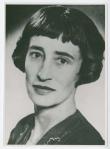Born Ernestine Hemmings, Hill was educated at All Hallows' School and Stott and Hoare's Business College, Brisbane, Queensland. After working briefly in the public service she joined the staff of Smith's Weekly, Sydney, in 1919, as secretary to its literary editor J. F. Archibald. Hill subsequently became sub-editor of the paper and consolidated her career as a journalist during the 1930s when she travelled extensively across Australia writing articles for Associated Newspapers and other publications such as Walkabout. Her articles were popular, widely read and sometimes controversial: her reporting of a gold strike in the Northern Territory in 1931 contributed to financial ruin for some people and was branded irresponsible; another, a front page story for the Sunday Sun, 19 June 1932, marked the beginning of a long and sometimes turbulent association with Daisy Bates. Bates eventually confirmed Hill's claim to have ghostwritten Bates' book The Passing of the Aborigines.
The majority of Hill's published works, mostly non-fiction, arose out of her travels during this period. Her only published novel was the immensely successful My Love Must Wait (1941), based on the life of Matthew Flinders. Between 1940 and 1942 Hill was editor of the women's pages of the A.B.C. Weekly and from 1941-1944 she was a commissioner of the A.B.C. After her resignation from this position she resumed her travels, working constantly on ideas for future novels, plays, travel and historical books and radio and film scripts. Apart from The Territory (1951) and a few articles, none of these were ever published. Hill was awarded a Commonwealth Literary Fund fellowship in 1959, which provided her with a small pension, but the last years of her life were dominated by financial hardship and ill-health. She returned to Brisbane in 1970 and died there in 1972.
 6791580772946691037.jpg
6791580772946691037.jpg